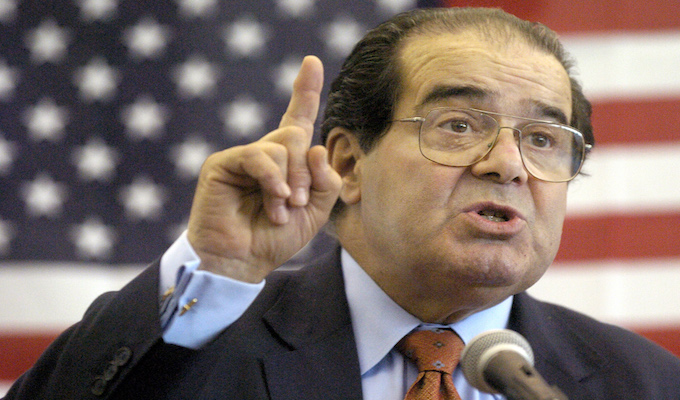WASHINGTON — In the marbled chamber of the nation’s highest court, there was no larger presence than that of Justice Antonin Scalia.
His shocking and unexpected death is still difficult to believe.
Having covered the Supreme Court for a decade, sitting through countless arguments — and with Scalia on the bench, they were arguments, indeed — I can’t imagine returning there later this month and not seeing him on the bench.
But boy, did he leave his mark there.
His voice boomed, often accompanied by gestures that would make his Italian ancestors proud. He would openly excoriate lawyers not only for their legal positions, but for daring to commit breaches of high court etiquette like failing to include the text of relevant statutes in the brief.
He harrumphed at questions and comments from other justices. His verbal sparring matches with Justice Stephen Breyer were legendary battles of wit. And Scalia was by all accounts the court’s funniest justice, spurring belly laughs from the audience dozens, if not hundreds of times each term — far more than any of his fellow jurists.
“I mean, if the police arrest Mother Teresa, they are still entitled to frisk her, right? Even though there’s little likelihood that she has a gat?” Scalia deadpanned during a 2008 hearing in a search and seizure case.
He was also one of the most divisive political figures in our nation’s history, despite the court’s design as an apolitical and independent arbiter of the Constitution and federal law.
His staunchly conservative voice in the court’s most politically controversial rulings was loud, no matter if it was on the winning or losing side — making him as much a hero to the right as Justice Ruth “Notorious R.B.G.” Bader Ginsburg is to the left.
Scalia called the court’s reasoning in upholding Obamacare “pure applesauce” and “jiggery-pokery.”
In striking down a Washington, D.C., handgun ban, he dismissed the argument that the Second Amendment was meant primarily to arm militias as “worthy of the mad hatter.” He openly admitted his belief that Roe v. Wade and the court’s ruling upholding affirmative action programs were wrongly decided.
Perhaps the most shocking moment I experienced as a reporter at the court was this past December, when during arguments in the case challenging the University of Texas’ affirmative action plan, Scalia said: “I’m just not impressed by the fact that the University of Texas may have fewer (black students). Maybe it ought to have fewer.” I saw red, and said so in the pages of this paper. But even if he read my words, it would matter little. Scalia answered to no one but himself.
No matter what anyone might think of Scalia’s positions, it’s difficult not to respect his place in the court’s history. There will truly never be another Antonin Scalia.
___
(c)2016 the Boston Herald
Visit the Boston Herald at www.bostonherald.com
Distributed by Tribune Content Agency, LLC.
—-
This content is published through a licensing agreement with Acquire Media using its NewsEdge technology.



















Recent Comments